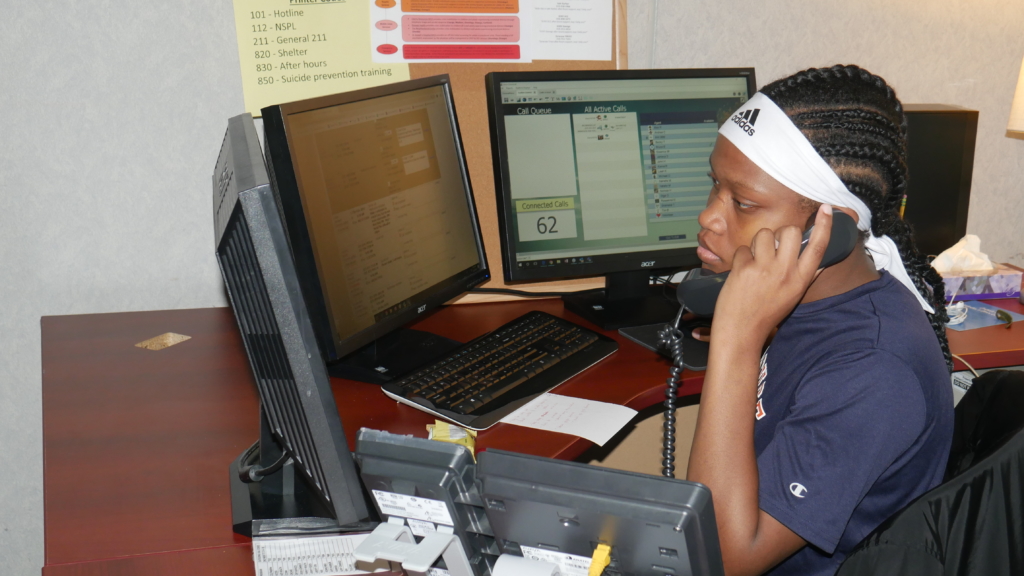Since 1971, volunteers have been the heart of Contact Community Services. What began as a 24-hour crisis hotline staffed entirely by volunteers has grown into a robust network of support for the Central New York community. Today, more than 25 dedicated volunteers support our TeleCare and Contact Hotline programs—offering comfort, connection, and hope to those who need it most.
Volunteer shifts are available 365 days a year in the following time blocks:
- 7:00 AM–11:00 AM
- 11:00 AM–3:00 PM
- 3:00 PM–7:00 PM
- 7:00 PM–10:00 PM
All training and volunteer work take place in-person at our East Syracuse office.
Our volunteers—ranging in age from 18 to 80+—bring a rich diversity of lived experiences that strengthen the care we provide. What unites them all is a shared commitment to helping others feel heard, valued, and less alone.
Whether you’re looking to give back, build skills, or connect with your community, we welcome you to explore how you can get involved.
Volunteer Opportunities include:
TeleCare is a free telephone reassurance program that supports isolated or vulnerable individuals through brief, scheduled calls. Volunteers provide:
- Medication reminders
- Welfare checks
- Friendly conversation and emotional support
TeleCare Training:
About 4 hours, including orientation, sample calls, and practice using our phone and documentation systems.
Support:
Staff are always present to offer coaching, answer questions, and ensure volunteers feel confident in their role.
Growth Path:
After completing six months of successful service with TeleCare, volunteers may become eligible for cross-training on the Contact Hotline. This next step allows volunteers to expand their skills, deepen their impact, and support a broader range of callers—many of whom are navigating more complex emotional or mental health challenges.
The Contact Hotline is a free, confidential, 24/7 emotional support line that offers a safe space for individuals experiencing emotional distress, isolation, or crisis. Callers may be struggling with anxiety, grief, relationship issues, financial hardship, loneliness, or other overwhelming life circumstances. While some calls involve thoughts of suicide or self-harm, the majority are from people who simply need someone to talk to—a compassionate, nonjudgmental voice on the other end of the line.
Volunteers on the Contact Hotline are trained to meet callers where they are, offer emotional validation, and support individuals in exploring their feelings, identifying strengths, and considering possible next steps. The goal is not to fix or advise, but to listen with empathy and offer presence in moments when it’s needed most.
Hotline Training:
Our Hotline Training is designed to build your confidence step-by-step, combining knowledge-building with real-world application in a supportive environment.
- Observation (Three 4-hour shifts):
Begin your journey by sitting alongside experienced volunteers/staff during live shifts. You’ll observe how calls are answered, how emotional support is provided, and how active listening and boundaries are applied in real time. This phase helps you become familiar with the pace and tone of the work before taking calls yourself. - Self-Guided Learning (10–20 hours):
Complete a series of interactive online modules at your own pace. Topics include active listening techniques, understanding suicidal ideation, crisis de-escalation strategies, ethical communication, and recognizing when to involve staff. These foundational skills prepare you for your hands-on practice and real calls. - Role Plays & Discussion (4 hours):
Practice makes progress. In small group or one-on-one sessions, you’ll participate in guided role plays that simulate common call scenarios. This provides a safe environment to practice listening skills, ask questions, receive feedback, and build confidence before entering the call center floor. - Apprenticeship (Four 4-hour supervised shifts):
Take live calls while under close supervision. Trainers will be by your side to offer coaching, debrief after calls, and help you refine your approach. This phase bridges training and independent volunteering, ensuring you’re fully prepared to support real callers.
Timeline:
Training is typically completed over the course of two months, depending on your availability.
Ongoing Support:
Staff are always present during shifts to provide guidance and backup, and continued development is encouraged through additional trainings.

Questions?
For more information regarding Volunteer Opportunities, please call 315-251-1400 x115 or email [email protected].
Application for Training
Please click on the button to complete this brief online application for training.
